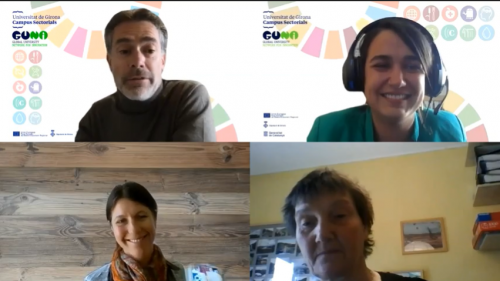EdiCitNet joins #Flowers4Bees campaign to raise awareness of the threats faced by pollinator insects
Apples and pears, coffee, almonds, avocado, pumpkin and zucchini: what looks like your last shopping list may actually disappear from your dining table if pollinator insects such as bees went extinct. And this scenario is getting more realistic with each passing day due to increasing urbanisation, high pollution levels and destruction of green spaces.
One key step to save pollinators is to make everyone understand the tight bond between our lives and their survival. Want to help but unsure how? In this case, the answer is a hashtag: #Flowers4Bees!
#Flowers4Bees is a social media campaign celebrating World Bee Day (May 20) and raising awareness of the importance of bees and pollinators in general. Joining us is easy: from May 3 to June 4, take a picture of a flower and/or a bee and post it on the dedicated Facebook group of the campaign, or on your Twitter profile – in this case, do not forget to use #Flowers4Bees or we will not be able to find your picture!
#Flowers4Bees is an initiative of the following projects that are working together to make our cities more sustainable, green and liveable:
- URBAN GreenUP
- proGIreg
- Oppla
- UNaLab
- INTERLACE
- NetworkNature
- EdiCitNet
- GrowGreen
- CLEARING HOUSE
- My Wild City
How do these projects achieve that goal? All of them are designing and installing innovative nature-based solutions in many European cities. These are interventions inspired by nature and they tackle urban problems such as poor air quality, limited biodiversity, flooding and high temperatures.
Bees and other pollinator insects are happy to see nature-based solutions pop-up in cities all over Europe. One intervention they are certain to enjoy are pollinator houses, that help them move across the city and reach as many green areas as possible by providing native bees, moths, butterflies and other regional pollinators with nesting sites. Pollinators benefit from the planting and cultivation of a range of edible plants too – in particular herbs like borage, basil and lavender, fruit trees and vegetables like squash and green beans.
Follow the hashtag #Flowers4Bees to discover some of the pollinator-friendly solutions installed by these different projects and the different ways that cities around the world are supporting bees to pursue their crucial mission of pollinating countless different species of fruits and vegetables.
URBAN GreenUP, proGIreg, UNaLab, INTERLACE, NetworkNature, EdiCitNet, GrowGreen and CLEARING HOUSE have all received funding from the European Union’s Horizon 2020 Research and Innovation Programme. Oppla is supported by the European Commission under the Environment (including climate change) Theme of the 7th Framework Programme for Research and Technical Development.


